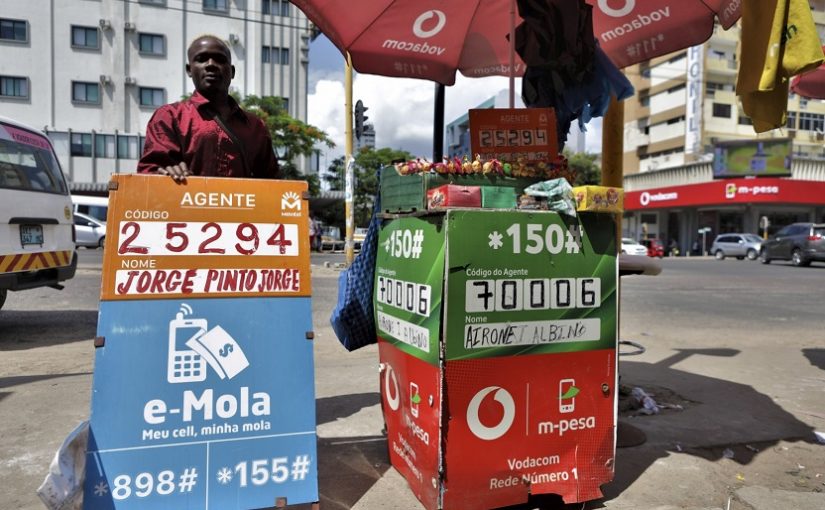Mozambique: External donations fell by almost half in 2024, totalling €520 million
Mozambique: Mobile fintech stalls are an alternative to unemployment in Maputo

Photo: Luisa Nhantumbo/Lusa
In the hustle and bustle of the heart of the Mozambican capital, no effort is spared to escape unemployment and, among the youth, the option now is the small improvised stalls of agents who sell financial services by mobile phone.
“I’ve been doing this job for three years, and I do it normally, bearing in mind that young people nowadays have to chase opportunities in order to earn a living,” Jorge Pinto told Lusa, a few metres from his stall set up between Eduardo Mondlane and Karl Marx avenues, in the centre of Maputo.
Data from the latest population census (2017) by the National Statistics Institute indicates that, of the 32 million Mozambicans, around 9.4 million are young people, a third of whom have no job, schooling or vocational training.
For many years, Jorge Pinto was part of these statistics, but in 2021, he decided to leave the province where he was born (Zambézia) to become a mobile phone financial services agent in the capital.
“I was born in a country where things are a bit complicated, but I manage to support myself from this job. I can send some money, at least a thousand meticais [€14] a week, to my family in Zambézia,” adds Jorge Pinto, who, as well as financial services, sells sweets and biscuits from his improvised stall.
Like so many other young people who have taken up this business, Jorge, 25, survives on the commissions taken from each transaction requested by a customer, which vary depending on the amount deposited or transferred from the three electronic money institutions belonging to the three mobile telecoms operators in Mozambique.
“This business makes our lives easier. At least we avoid breaking into other people’s houses to steal,” said José Sebastião, another young mobile phone financial services agent, as he attends to a customer at his makeshift stall in the middle of Maputo’s hustle and bustle, between 24 de Julho and Filipe Samuel Magaia avenues.
Like Jorge Pinto, José Sebastião, 29, comes from Zambézia province in the centre of Mozambique and, in search of opportunities, has also been in the business for almost three years.
“It’s enough to support the family,” says José Sebastião, noting the growing number of people in the country looking for financial services by mobile phone.
According to data from the Bank of Mozambique, in 2021, the country had 11,412,194 Electronic Money Institution (EMI) accounts and, the following year, 11,975,063. In 2023, this figure had skyrocketed to 16,607,021 by October alone, while the banks have almost 5.5 million accounts.
“Many people, especially in rural areas, don’t have access to banks and therefore use these services. For example, I studied in Magude [in Maputo province], and there, most people don’t have bank accounts. They use these services,” Edilton Xavier, a client of José Sebastião, explained to Lusa.
But the increase in the number of people looking for these services brings with it new challenges for the young people who have taken up the business, particularly scams, with increasingly sophisticated strategies, and even robberies of the agents, who are sometimes forced to carry cash from deposits made by clients.
“There are a lot of scams, and all of us have to be vigilant. You have to check the person’s name and number carefully during the transfer. Not only that, there are people who get our contact details and call to ask us to make transfers, with the intention of scamming us,” laments Moisés Mateus, another agent whose stall is based in Karl Marx.
Moisés Mateus also preferred to diversify his business and, in addition to mobile phone financial services, he also shines shoes.
“I’m evolving slowly, so I’m following the road. I’m not going to stop,” concludes the young agent.
According to a statistical report from the central bank, with data from January to October, the EMIs totalled 401,178,582 transfers in this period – 338.5 million operations in the whole of 2022 and 324.1 million in 2021 – handling more than 340.2 billion meticais (€4.86 billion).
Mozambique currently has three Electronic Money Institutions, owned by the three mobile telecom operators, which provide financial services via mobile phone, including money transfers between customers or payment for services.
Tmcel’s mKesh Mobile Wallet was the first to be set up in Mozambique in 2012, followed by Vodacom’s M-Pesa in 2013 and Movitel’s e-Mola the following year.
This is a solution that makes it easier and more widespread for the population to access financial services using only their mobile phones.
In its budget proposal for 2024, the Mozambican government plans to continue its fiscal policy reforms to “increase the level of revenue collected”, namely by “taxing the commissions of electronic money agents and institutions”.












Leave a Reply
Be the First to Comment!
You must be logged in to post a comment.
You must be logged in to post a comment.